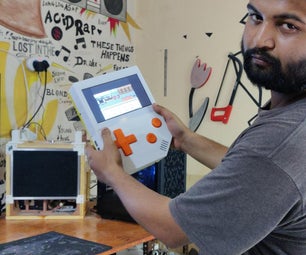Introduction: Make a Mesmerizing Light Pattern Clock by Upcycling an Old Clock and CD
Hi readers in this instructables i will show you how I made this light pattern clock that changes its color when viewed from angles using upcycled materials
This Clock is special because it produces different colors of light when viewed from different angles
A Small story behind the origin of this clock!
I was looking my old boxes to check if i had any thing to make some interesting stuff for my desk, an old clock that had the front shield broken, and no longer fit to use directly caught my attention!
I cleaned the outside part and wanted to check if the mechanisms still works, when i inserted the battery it started to make that click click sound, then i decided it to give a makeover and change it completely.
The main aim of this project was to use the recycled materials, here almost every part is recycled like for the mechanism.
I used old clock machine, for the time indicator I used keys from my old keyboard and the CD for pattern was upcycled from unused CD, except for the led strip and batteries everything used here i found as a junk at home.
Now let us dive into the process of building this project
Supplies
- OLD clock
- CD that was left unused
- Non working keyboard from my old laptop
- aa Battery
- LED strip(preferred white)
- Sheet of paper
- Hot glue and super glue
- Battery holder and rechargeable 18650 batteries x3
- Switch
- Screw driver of star head
- Scissors
Step 1: Scavenging Clock Mechanism
The mechanism as well as the body of the clock were used in this project, so make sure you carefully remove the parts without damaging any of the parts.
I started by removing the screws at the back followed by opening the panel.
I saw the machine that runs the clock, this was attached to the frame using 2 screws, I removed those then I was finally able to separate the mechanism.
Now before working any further remove the pointers/needle of the clock.
I did not want to miss anything so i wrote down where exactly the pointers were placed on the machine.
Step 2: Clock Dials
Dials are the ones that help us identify where the needles are pointing.
I recycled the numbers on the keyboard that was no longer in use.
I used function keys as o found that the size of these are a good match compared to the size of the frame we are using.
It is very easy to pull out the keys, pull out 3,6,9 and 12.
Thank you PCBWAY
I thank PCBWAY for sponsoring this project
They provide an amazing service if you are willing to make electronic projects they can provide you with any type of PCB as per your requirement
They have come up with an initiative of sponsorship schemes, Know more about this here https://www.pcbway.com/project/sponsor/learnsponsor.aspx
For high-quality Flex Board, i recommend you to use PCBWAY click here to get your PCB today
Step 3: Adding Mechanism to the CD
Add few drops of superglue to the back part of the CD.
Now gently place the machine of the clock on this, make sure that the glue does not touch any parts of the actual moving part.
Hold it tight for a few seconds until the glue dries and there is no chance of side spillage.
In my clock i had a buzzer for the alarm, even i used superglue to stick this to the back part of the CD
Step 4: Adding LED Strip
As the corners of the CD is very thin we can't add the LED strip directly, so i cut a strip of paper and later glued to the edges of a circle.
This has to be done neatly, any amount if extra glue would spoil your cd and leaves impressions that are very clear to see when the LED bulb glows.
Glue the strip to all the ends, now cut the same length led strip and using the double sided tape given in the LED stick along with the inner surface.
Finally check if the connections are correct by connecting batteries to the LED strip.
You can refer the above visuals for more understanding.
Step 5: Adding the Dials
Before marking the dials we need the exact points where it has to be marked.
To do this i have the circle slightly smaller than the diameter of CD.
Cut the center holes, now fold the paper to get the center point.
As we can see now we have 4 lines each indicating quarter of 12 hours.
Place this on the surface of CD and mark the points.
Now to the marked points add a drop of glue and stick the keys/dials
Repeat the same for other 3 dials.
Step 6: Adding Pointers
Pointers or needles that we removed earlier with a note will be useful now.
To add more details i made use of the dotted type of paper from the old clock face.
I made use of the center part only, i sticked that to the center part of CD as you can see from the visuals.
After this is dried completely, we can start to add pointers one after the other.
Check if everything works fine by adding a battery to the clock machine.
Step 7: Assembling the Body
As i mentioned earlier i used the body of the clock, The space inside on the type of clock i used could fit 3 of the batteries perfectly.
I used 2 battery holders, one holder hold single battery and other holder holds 2 battery
The battery holders were connected in series later giving a total output of 11v
The LED strip glows at full bright at 12v, but we are giving 11v that s good for the life of LED's!
To elevate the clock i made use of a small stick and later i finished the circuit by adding a switch.
Adding this switching will not be difficult as it follows the very basic rules of circuitry.
Step 8: How to Use
Using this project is very fun and you can impress your friends with this
To use this project all you have to do is insert the battery into the clock if you have not inserted, set the time.
Switch on the power supply with the switch given at the back, now you will see that glow of light.
You can adjust the position of the lamp as per the way you like it.
You can switch it off when not in use, note that the batteries are rechargeable, whenever you want to recharge just take it out from the holder, charge it using the charger and put it back.
Step 9: Working Video
Don't miss this working video along with detailed tutorials on building this project.
Hope you will try to build this project in your free time, if you have any questions on the build you can ask me in the comments.
Thank you and have a great day.

Participated in the
Repair and Reuse Contest








![Tim's Mechanical Spider Leg [LU9685-20CU]](https://content.instructables.com/FFB/5R4I/LVKZ6G6R/FFB5R4ILVKZ6G6R.png?auto=webp&crop=1.2%3A1&frame=1&width=306)




